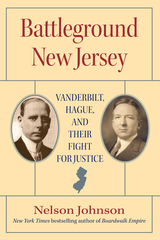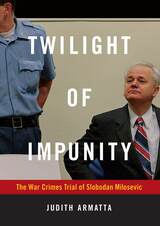5 books about Hague

Battleground New Jersey
Vanderbilt, Hague, and Their Fight for Justice
Johnson, Nelson
Rutgers University Press, 2014
New Jersey’s legal system was plagued with injustices from the time the system was established through the mid-twentieth century. In Battleground New Jersey, historian and author of Boardwalk Empire, Nelson Johnson chronicles reforms to the system through the dramatic stories of Arthur T. Vanderbilt—the first chief justice of the state’s modern-era Supreme Court—and Frank Hague—legendary mayor of Jersey City. Two of the most powerful politicians in twentieth-century America, Vanderbilt and Hague clashed on matters of public policy and over the need to reform New Jersey’s antiquated and corrupt court system. Their battles made headlines and eventually led to legal reform, transforming New Jersey’s court system into one of the most highly regarded in America.
Vanderbilt’s power came through mastering the law, serving as dean of New York University Law School, preaching court reform as president of the American Bar Association, and organizing suburban voters before other politicians recognized their importance. Hague, a remarkably successful sixth-grade dropout, amassed his power by exploiting people’s foibles, crushing his rivals, accumulating a fortune through extortion, subverting the law, and taking care of business in his own backyard. They were different ethnically, culturally, and temperamentally, but they shared the goals of power.
Vanderbilt’s power came through mastering the law, serving as dean of New York University Law School, preaching court reform as president of the American Bar Association, and organizing suburban voters before other politicians recognized their importance. Hague, a remarkably successful sixth-grade dropout, amassed his power by exploiting people’s foibles, crushing his rivals, accumulating a fortune through extortion, subverting the law, and taking care of business in his own backyard. They were different ethnically, culturally, and temperamentally, but they shared the goals of power.
Relying upon previously unexamined personal files of Vanderbilt, Johnson’s engaging chronicle reveals the hatred the lawyer had for the mayor and the lengths Vanderbilt went to in an effort to destroy Hague. Battleground New Jersey illustrates the difficulty in adapting government to a changing world, and the vital role of independent courts in American society.
[more]

A Stranger in the Hague
The Letters of Queen Sophie of the Netherlands to Lady Malet, 1842–1877
S. W. Jackman and Hella Haasse, eds.
Duke University Press, 1989
Princess Sophie Frederika Mathilde of Wurttemberg (1818-1877) married William, Prince of Orange (and her first cousin) in 1839. Sophie (as she was known) was alert, well-educated, and ambitious, far the intellectual superior of her husband; as the great-granddaughter of Catherine the Great of Russia, she may have aspired to play an important role in guiding the affairs of the House of Orange. This was not to be. After the birth of two sons, her relations with her husband cooled, and with a few important exceptions she became isolated from the other members of the family at the Hague. Partly to overcome the resulting personal and intellectual isolation she turned to an extensive correspondence with heads of state, royal relatives, aristocratic acquaintances, political leaders, and intellectual figures. Family difficulties continued and even increased after William ascended the throne in 1849.
Sophie met her friend and confidant Marina Dora Spading, Lady Malt, when the latter was at the Hague with her diplomat husband in 1842. A lifelong friendship ensued, although they saw each other only infrequently thereafter. Sophie’s letters to Lady Malt are an extraordinary combination of comments on her personal situation and shrewd analyses of the European political arena. This selection of her surviving correspondence is opinionated, frank, and perceptive, and her letters are a unique commentary on the affairs of the Europe of the mid-nineteenth century.
Sophie met her friend and confidant Marina Dora Spading, Lady Malt, when the latter was at the Hague with her diplomat husband in 1842. A lifelong friendship ensued, although they saw each other only infrequently thereafter. Sophie’s letters to Lady Malt are an extraordinary combination of comments on her personal situation and shrewd analyses of the European political arena. This selection of her surviving correspondence is opinionated, frank, and perceptive, and her letters are a unique commentary on the affairs of the Europe of the mid-nineteenth century.
[more]

Travesty
The Trial of Slobodan Milosevic and the Corruption of International Justice
John Laughland
Pluto Press, 2007
In 2006, Slobodan Milosevic died in prison in the Hague during a four-year marathon trial for war crimes. John Laughland was one of the last Western journalists to meet with him. Laughland had followed the trial from its beginning and wrote extensively on it in the Guardian and the Spectator, challenging the legitimacy of the Yugoslav Tribunal and the hypocrisy of "international justice."
In this short book, Laughland gives a full account of the trial---the longest trial in history---from the moment the indictment was issued at the height of NATO's attack on Yugoslavia to the day of Milosevic's mysterious death in custody. "International justice" is supposed to hold war criminals to account, but---as the trials of both Milosevic and Saddam Hussein show---the indictments are politically motivated and the judicial procedures are irredeemably corrupt. Laughland argues that international justice is an impossible dream and that such show trials are little more than propaganda exercises designed to distract attention from the war crimes committed by Western states.
"Study this story. . . . The truth is hard to find, but in John Laughland we are fortunate to have a man blessed with the desire to find the truth."
---Ramsey Clark, from the Foreword
In this short book, Laughland gives a full account of the trial---the longest trial in history---from the moment the indictment was issued at the height of NATO's attack on Yugoslavia to the day of Milosevic's mysterious death in custody. "International justice" is supposed to hold war criminals to account, but---as the trials of both Milosevic and Saddam Hussein show---the indictments are politically motivated and the judicial procedures are irredeemably corrupt. Laughland argues that international justice is an impossible dream and that such show trials are little more than propaganda exercises designed to distract attention from the war crimes committed by Western states.
"Study this story. . . . The truth is hard to find, but in John Laughland we are fortunate to have a man blessed with the desire to find the truth."
---Ramsey Clark, from the Foreword
[more]

Twilight of Impunity
The War Crimes Trial of Slobodan Milosevic
Judith Armatta
Duke University Press, 2010
An eyewitness account of the first major international war-crimes tribunal since the Nuremberg trials, Twilight of Impunity is a gripping guide to the prosecution of Slobodan Milosevic for war crimes, crimes against humanity, and genocide. The historic trial of the “Butcher of the Balkans” began in 2002 and ended abruptly with Milosevic’s death in 2006. Judith Armatta, a lawyer who spent three years in the former Yugoslavia during Milosevic’s reign, had a front-row seat at the trial. In Twilight of Impunity she brings the dramatic proceedings to life, explains complex legal issues, and assesses the trial’s implications for victims of the conflicts in the Balkans during the 1990s and international justice more broadly. Armatta acknowledges the trial’s flaws, particularly Milosevic’s grandstanding and attacks on the institutional legitimacy of the International Criminal Tribunal. Yet she argues that the trial provided an indispensable legal and historical narrative of events in the former Yugoslavia and a valuable forum where victims could tell their stories and seek justice. It addressed crucial legal issues, such as the responsibility of commanders for crimes committed by subordinates, and helped to create a framework for conceptualizing and organizing other large-scale international criminal tribunals. The prosecution of Slobodan Milosevic in The Hague was an important step toward ending impunity for leaders who perpetrate egregious crimes against humanity.
[more]

Women at The Hague
The International Congress of Women and Its Results
Jane Addams, Emily G. Balch, and Alice Hamilton
University of Illinois Press, 2003
In the midst of World War I, from April 28 to May 1, 1915, more than a thousand women from Europe and North America gathered in The Hague to discuss proposals for a peaceful end to the war. As one of the founders of the Woman's Peace Party, Jane Addams was among the attendees at the International Congress of Women, along with fellow social reformers and peace activists Emily G. Balch and Alice Hamilton. This book contains their journalistic accounts of the Congress's proceedings and results as well as their personal reflections on peace, war, politics, and the central role of women in the preservation of peace.
Following the conference in The Hague, Addams and Balch traveled around Europe as members of delegations visiting various governmental leaders to demand an end to the war. In this book they describe the activities of these delegations, painting a vivid portrait of the emerging women's peace movement.
With the continuing growth of the peace movement, the essays in Women at the Hague remain as timely as they were when first published in 1915. Addams, Balch, and Hamilton write compellingly about the organizing methods and collaborative spirit of the women's peace movement, conveying a strong awareness of the responsibility of women to protect the global community from the devastating effects of war.
Following the conference in The Hague, Addams and Balch traveled around Europe as members of delegations visiting various governmental leaders to demand an end to the war. In this book they describe the activities of these delegations, painting a vivid portrait of the emerging women's peace movement.
With the continuing growth of the peace movement, the essays in Women at the Hague remain as timely as they were when first published in 1915. Addams, Balch, and Hamilton write compellingly about the organizing methods and collaborative spirit of the women's peace movement, conveying a strong awareness of the responsibility of women to protect the global community from the devastating effects of war.
[more]
READERS
Browse our collection.
PUBLISHERS
See BiblioVault's publisher services.
STUDENT SERVICES
Files for college accessibility offices.
UChicago Accessibility Resources
home | accessibility | search | about | contact us
BiblioVault ® 2001 - 2024
The University of Chicago Press









